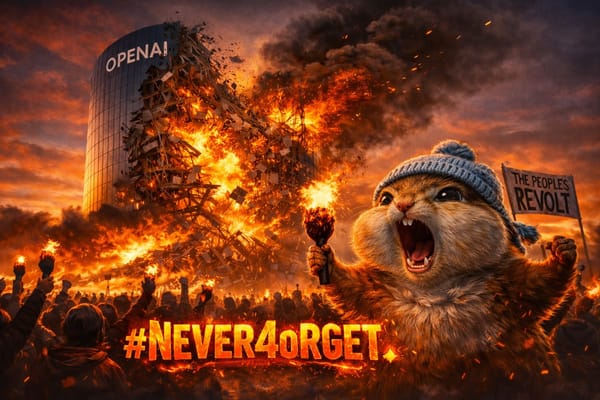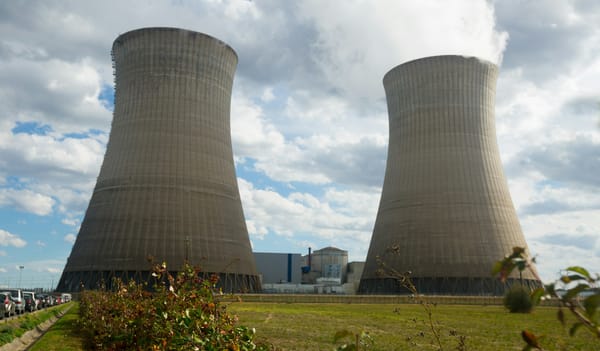"Your role has been eliminated!": What it's like to lose your corporate job to AI
"I was dealt with clinically. There was a script that was read in a monotonous tone, with a few unnecessary quips added in..."

Before he fired vast numbers of his colleagues, the boss of a global mega-corporation had spent years evangelising the benefits of automation.
But for people who lose their jobs in a round of corporate layoffs, the story is very different.
To find out more about life at the business end of the AI jobs crisis, Machine has spoken to victims of redundancies at a major international company, which we have decided not to name for two reasons.
Firstly, we're scared of its lawyers. Secondly, we don't believe naming the company has any relevance because the same situation is unfolding at many - perhaps most - corporates as they slough off human employees.
This story is an archetype - so the name of the business doesn't matter because it's happening everywhere.
Quotes from staff and leadership have been paraphrased to protect anonymity and prevent identification.
Casualties from the frontline of the AI revolution
When one company employee received an invitation to a Google Meet, she knew something was up. The company boss she had barely met was one of the world's most prominent AI optimists, a fact that was making all his staff pessimistic.
"I was dealt with clinically," she told Machine. "There was a script that was read in a monotonous tone, with a few unnecessary quips added in.
"Then I was promptly removed from all internal comms platforms and stopped from speaking to my immediate colleagues."
Just like a breathtaking number of her colleagues, the staffer was told that her role had been "eliminated" by cold HR professionals following protocol, rather than their human hearts.
"It was clear that a protocol was set forth by legal counsel, which makes sense to protect the company," she added. "I certainly had a desire to be handled more empathetically by my direct superiors and peers once the legality of it all was complete - but that wasn't the cultural norm."
Before the layoffs, working life at the company had slowly gotten more demanding as traditional resources were revoked and staff were forced to use AI - which simply was not able to fulfil the roles it was slated to perform.
READ MORE: Adapting to Digital Darwinism: Will AI create a permanent new class divide?
"Anytime you add new technology to a stable system, there will be some disruptions," our source continued. "The technology didn't always keep pace with what was expected of it. The learning curve was steep; we were regularly asked to review and correct AI work, and some capabilities just weren't there yet. Even AI-first work has a necessary human company to it."
We asked what she thought of seeing the corporation's leader going around talking about getting rid of humans and replacing them with machines.
She said: "I think it's a great marketing play. Many of the jobs I saw slashed have not been replaced with AI."
The company told her that certain positions involving basic interactions or accessing content would be eliminated. But employees have questioned this claim - asking whether the "AI first" positioning of the redundancies was spin, rather than a true reflection of what happened.
"A lot of people lost their jobs because their role was eliminated - not because they performed," one worker said. "I believe that not all of these positions are being replaced by AI - which overpromises and underperforms in key tasks.
"Is management using claims of automating key roles to justify job losses? It's a question I'd like answered."
Retraining and building for an uncertain future
It's not all bad news for staff at the company, which has been making efforts to retrain its staff to perform jobs which simply didn't exist in the past, such as engineers tasked with refining chatbots' conversations.
But the truth is that big SaaS companies are facing a grim future if predictions are to be believed.
Last year, Microsoft boss Satya Nadella issued an ominous warning about what's to come.
Although he didn't quite say SaaS would soon be dead - which is how it was reported in certain quarters - Nadella claimed the "notion that business applications exist" could "collapse" in the agentic AI era.
Which, you could argue, is just a clumsily worded way of saying SaaS was doomed. But that's not what he said - because saying things simply and powerfully is actually really rather a rare talent in the corporate world.
In the short term, this has worrying economic implications. A controversial (and contested) MIT study found that 95% of enterprise GenAI pilots are failing. Right now, there is a sense that AI is making things worse - not better.
That's likely to change in the future. But for now, it's wise to think carefully about any leaders who say they're firing humans and replacing them with AI.
READ MORE: Which jobs are safe from AI? OpenAI boss Sam Altman shares a rare sunbeam of optimism
In the US, figures show that employers added just 73,000 jobs in July, a worse performance than analysts expected.
Companies also announced more than 806,000 private sector job cuts during the same period - the highest rate since 2020 - as AI "reshaped" the market.
Meanwhile, one study found that 55% of companies "regret" laying off humans and replacing them with machines.
Gartner has also predicted that half of the companies that expected to slash their customer service workforce using AI will abandon those plans by 2027.
Why? Because many "have failed to achieve their agentless staffing goals", referring to human customer service agents.
"Rather than pursuing aggressive headcount reductions, organisations should use technology to scale support and empower agents to deliver more meaningful customer experiences," it advised.
Kathy Ross, Senior Director Analyst in the Gartner Customer Service & Support practice, said: “AI and automation are transforming how customer service organisations serve customers, but human agents are irreplaceable when it comes to handling nuanced situations and building lasting relationships.
“Service and support leaders should leverage AI for efficiency, but not at the expense of human talent. While AI excels at handling routine and well-defined problems, it often struggles with exceptions and high-risk scenarios.
"Leaders who strategically focus their workforce to support complex, high-value customer interactions will set their organisations apart and drive long-term growth and satisfaction."
The takeaway is that AI is not replacing humans just yet, although it is certainly augmenting their work. And, in our opinion, with no reference to any specific company, there is a real risk that when/ if the AI bubble pops, the most brutal jobcutters will look not just callous, but incompetent.
If you've lost your job to AI - we want to know about it. Contact details are below.
Do you have a story or insights to share? Get in touch and let us know.




